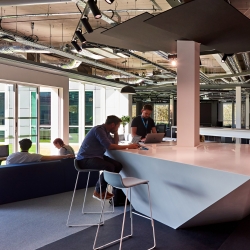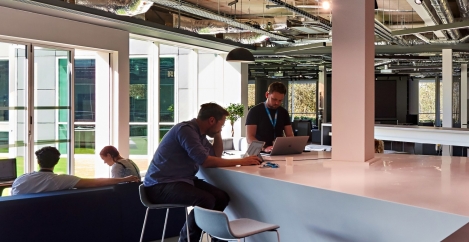October 16, 2020
Younger people most affected by disconnect of remote work
 Over a third of younger office workers forced to work from home feel remote, unfocused and less committed to their employers, posing a real threat to businesses in the medium and long term, new research from Oktra claims. Of 1,500 people surveyed, who used to work in an office full time but have been working at home for the last six months, the experience has changed the way that 71 percent of them feel about their employer; 85 percent have struggled with the experience of remote work.
Over a third of younger office workers forced to work from home feel remote, unfocused and less committed to their employers, posing a real threat to businesses in the medium and long term, new research from Oktra claims. Of 1,500 people surveyed, who used to work in an office full time but have been working at home for the last six months, the experience has changed the way that 71 percent of them feel about their employer; 85 percent have struggled with the experience of remote work.
Younger workers are most affected: 59 percent struggle to stay motivated, ground down by a home set-up that is not as inspiring or as professional as the office (67 percent), missing out on career development (50 percent) and on the face-to-face contact which 86 percent regard as important for building strong working relationships.
They are lonely too, with 34 percent missing friends from work. With “the people” being rated the most attractive aspect of their company by 56 percent of respondents, it is perhaps not surprising that isolation is leading to a loss of commitment and team spirit.
It all points to a generation of potential future leaders who are feeling increasingly less committed to their employers, their work culture and their professional future, the report claims. Business managers are acutely aware of this threat and many, who have invested significantly in making their offices Covid-safe, are desperate to keep staff on site.
Comments from business leaders
“Our research shows that the vast majority of workers (84 percent) are itching to get back to the office, at least for some of the week, (just 16 percent want to work from home full time) with the younger staff, the leaders of the future, the most unhappy. Over a third (36 percent) of workers aged 16-34 have lost enthusiasm for their company, posing a real threat to the future of their businesses. We call this ominous combination of empty offices and remote working isolation “The Vacancy Effect”, says Craig Smith, Chief Development Officer at Oktra.
Paul Richardson, Executive Chairman of Gymshark (UK-based billion pound company started in 2012, average age of staff under 30): “We see the risk to our business in the long term and we will encourage our staff to attend the office whenever possible.” Gymshark (main picture) reckons the pandemic has “fast tracked us about three years in terms of remote working, and it will be a more blended work and life in the future” with the organisation looking towards having around 60 percent of its staff in the office at any one time.
[perfectpullquote align=”right” bordertop=”false” cite=”” link=”” color=”” class=”” size=””]The pandemic has fast tracked us about three years in terms of remote working[/perfectpullquote]
“We can never imagine not having an office” summarised Tracey Gleig, Executive and office Manager at video game company Square Enix. “The culture is an important attraction of the company and we are an organisation that needs to collaborate. The people who are struggling the most with this situation are our younger staff, many of whom live in shared flats with little or no private space. They need the social aspects of a workplace and miss the inclusive culture.”
Lee Wilcox, Managing Director of social media publishing group Electric House goes further on the subject of remote work: “we have already seen an impact on our business. It depends upon a strong collaborative and accepting culture to operate effectively. Three months into lockdown we could see the culture changing and productivity starting to decline.”
Wilcox is particularly concerned about the mental health of his predominantly young team. “We talk about keeping them safe and we have made our workplace as safe as we possibly can, following all Government guidelines. But it’s not just Coronavirus that affects people’s heath. Isolation, lack of social contact and the inability to do the job properly are all having an effect too. “We are a technology-based business, but togetherness is one of our core values and you can’t create that over a screen. It’s much harder to work remotely over time and we will start to see breaking points. It’s definitely a threat to our business and I would never want to operate 100 percent remotely.”
Barry Horner, CEO of Financial Planning consultancy Paradigm Norton agrees. “Remote working is having a negative impact on our business, particularly around the speed of execution. It has not adversely affected our clients, but we have definitely experienced delays with a number of big internal projects. We are starting to spot the signs that being at home is just not working for some of our team. We really want to support government guidelines but at the same time we have an obligation to the team and we can see that they are starting to struggle. That’s bad for our staff and ultimately bad for our business.”
All four organisations interviewed were looking to develop a long-term strategy, accepting that Covid-19 is likely to be circulating in the population for many months at least. All called on the Government to be clearer and more consistent in their advice to businesses, and all are planning to keep their offices open for at least a skeleton staff.
“It’s a really delicate balance for businesses at the moment” continues Craig Smith at Oktra. “Of course no-one is suggesting that all staff should be compelled to return to their offices right now, but we are clearly seeing that in the longer term the physical office environment plays a key role in the recruitment, retention and performance of staff and consequently of the long term performance of many companies.”












